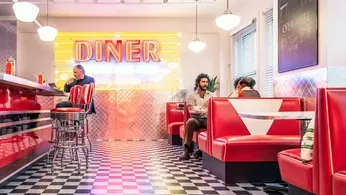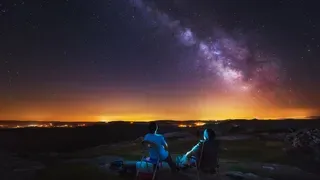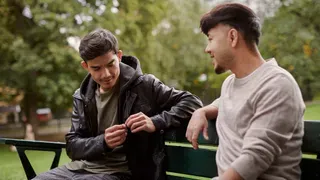
September 30, 2024
Peripheral Visions: A Song of the Low Red Sun
Kilian Melloy READ TIME: 17 MIN.
Peripheral Visions: They coalesce in the soft blur of darkest shadows and take shape in the corner of your eye. But you won't see them coming... until it's too late.
A Song of the Low Red Sun
The diner was styled in black and white, with a tiled floor that looked like a chessboard, formica tabletops that had become discolored overtime but still gleamed, and white walls that looked as though they had been freshly painted. The interior took the shape of an L, with tables dotting the floor and spaced along the tall windows that looked over the parking lot, the broad street crowded with slow-moving, antiquated gas-burners, and the city's skyscrapers, which were shrouded in brownish-yellow wreaths of smog. Booths nestled against the wall opposite the windows, little cubicles of white tabletop and red vinyl banquettes. More dots of red stood out from the vinyl of the stools that stood before the long bar stretched in front of a mirrored area where a man in a dingy white uniform worked a soda fountain.
Conor marveled. Even now, in America's senescence, in the midst of poverty and general decline, you could find a place like this in New York City: A place that looked like it came straight out of the 1950s, an era that the people here still held up as a golden age that reflected the hopes and aspirations they liked to call the American Dream.
Conor gestured at a booth. "Will this be okay, Mr. Stokes?" he asked the older gentleman.
"This is fine," Stokes said. "Please call me William."
Conor had worried that getting into the booth would be hard on the old man, but Stokes slid into the booth with no difficulty. Then he looked up at Conor as the young man took a place across the table. Conor was distracted for a moment by a small machine on the table, next to the glass window. It was a tiny jukebox, he realized.
"Does this work?" he asked, inspecting the juke box.
"Oh, yes, it certainly does," Stokes told him.
A menu of songs was visible through the curved glass window of the juke box. Conor reached over and pressed a button, causing the menu to flip to another page. He pressed again, then again, and read through the last of the jukebox's selections. None of his songs were on offer. Everything was from a century and a half earlier.
"You've come a long way, young man," Stokes said, breaking into Conor's reverie.
He looked up and saw that Stokes was smiling at the tiny jukebox.
"I don't think they have changed the selections in this place the entire time I've been coming here," Stokes added. Punching a couple of buttons, he specified a song, then held up his watch to pay for the selection. "We can choose up to twelve songs for the price I've paid," he said. "Do you have any preferences?"
"No, I'm... I'm not familiar," Conor said. "I'll let you pick."
Stokes scrolled through the jukebox's menu, punching in numerical codes for one song after the next. Finally, he sat back as music began to play. The jukebox looked antique, but it was state of the art and made use of sonic funneling. The music wouldn't be audible beyond the booth.
It would also, Conor knew from his pre-travel research, provide some limited protection from the diner's monitoring devices, which were keyed to listen for certain words and phrases and zero in on politically suspect conversations.
"Is this why you suggested this place?" Conor asked, wondering if Stokes was anxious over the discussion they were bound to have. "For the music?"
"Now that you mention it, that would have been a good reason," Stokes said. "But, no. I thought it would be convenient to both of us, since you are staying at the Oberth Hotel."
"And you don't live too far away?"
"No, I'm within walking distance."
"You walk? Out in that air?"
"I use the pedestrian tunnels," Stokes told him. "The air isn't completely fresh down there, but it's much better than on the surface."
"I'd hope so." Conor himself had arrived via automobile – one of the newer models that were starting to appear on American streets now that electric cars were legal again.
Even the Autocracy had to adapt to the times, Conor thought, and now that the last of the oil was nearly gone the days of the gas burners were finally winding down... too late to save the planet, but at least he would live to see the day those dinosaurs went extinct.
"Is the pollution bad in Ireland?" Stokes asked.
"We get what we call American weather," Conor said. "Hot, smoggy days. Not as bad as this, of course, but it's bad enough."
"And all your smog comes across the Atlantic Ocean? From here?"
"Europe, Asia, Africa... none of those places still pollute the air," Conor told him. "Even Russia has taken to clean energy. America's the last place that still thinks sustainable ecological management is a hoax or a conspiracy to somehow rob you of your freedoms or turn you sterile."
Stokes chuckled. "The chemicals in our drinking water are doing plenty to make us sterile, thanks."
The song faded out. A moment later, a new one started up.
"This is awkward segue," Conor said, "but it was the issue of sterility that drove the Faith and Family Laws in the late 2020s, wasn't it?"
"No, not at all," Stokes told him. "I mean, no to your question, and also it's not such a bad way to introduce the topic. You want to know why your mother fled America at the age of 13, is that right?"
"Yes. But I also want to know..." Conor hesitated.
"Why I didn't stop her?" Stokes smiled. "Because we weren't of an age, she and I. Her marriage was an arrangement to avoid breaking the law. Then, as now, it was a felony for a woman to remain unmarried by age fourteen, and to remain childless by age sixteen. The law had only come into effect a couple of years earlier, and people were still angry about it – or, alternatively, angry that anyone else was angry about it. It was a time of deep divisions in the country. We almost ended up with another civil war."
"But instead, you surrendered the rights of women and queers."
Stokes raised a warning finger to his lips, though a gentle smile lingered there. "Careful with your words," he said. "The music will help prevent us being overheard, but still. Certain terms and phrases are dangerous. And if you speak approvingly about, or even acknowledge, certain sorts of human attraction or relationships, you could be placed under arrest."
"I don't see any garda around," Conor said.
"We call them police here," Stokes said, "and for crimes like these... crimes of opinion, of expression... any citizen is empowered to make an arrest. In certain cases, citizens have even been exonerated for committing murder."
"So I've read in our press," Conor said, thinking of the Missouri man who had recently been found innocent after shooting two women he'd glimpsed holding hands in a park.
"Shall we stick to the topic?" Stokes asked, as a servitor whirred up to the table.
The servitor leaned close to the table, its synthesized voice becoming audible despite the music from the jukebox. "May I take your order?" it asked.
Conor had no appetite – he was far too nervous. But he knew from having read Greene's Guide that he could be fined for occupying a table at a public house without placing an order, so he requested a seaweed salad. Stokes asked for a soy sandwich.
"We have delicious milkshakes," the servitor told them in its synthesized voice. "Vanilla. Chocolate. Strawberry."
"The classics," Stokes smiled.
"Sure," Conor said. "Fine."
"One of each?" the servitor asked.
"No," Stokes intervened gently. "Two vanilla, please." He turned to Conor. "Unless you prefer another flavor?"
Conor shrugged.
The servitor whirred away.
"We should get to talking," Stokes said. "We only have half an hour before the restaurant's AI manager is within its rights to call the cops on us for vagrancy."
"I don't understand this country," Conor said as the song that was playing went into a repetitious coda and then faded out.
Again, Stokes pressed a finger to his lips.
After a moment a lively new song started up.
"It's considered an act of riot to critique the government, the culture, or the laws," Stokes told Conor in a murmur.
"And yet you people still rave on about your freedoms," Conor said. He knew the comment was imprudent, but he couldn't help himself. He sighed. "Okay, I guess there's no time for dancing around it. You're right: I wanted to meet the man my gran talked about so much. The man who broke her heart."
"And provided you a hit single," Stokes nodded.
"You've heard my song?"
"It's not banned here... unlike so many others," Stokes said.
"I wondered," Conor said, glancing again at the jukebox. "I know this is a nostalgia place. They wouldn't have contemporary music here. But I haven't found any of my work available on any of the streaming services I can access in this country."
"I found it on Terpi," Stokes said. "That's a costly service, but you'll find things on it you won't find anywhere else."
"I hope it was worth the price," Conor said, watching Stokes carefully.
"Well, Conor, you don't know me, and you only ever had your grandmother's perspective. But let's remember that she was a child at the time. Her being a child was exactly why I didn't do or say anything to stop her when she had the chance to flee to Ireland."
"Some of my aunts and uncles think that you... that she..." Conor paused, considering how to phrase it. "They think you would have found it convenient for her to leave when she did."
"You mean they think I impregnated her," Stokes said bluntly.
Conor blinked, then shook his head at the way a sentence like that could be uttered aloud without fear of prosecution. Back in Sligo, talking about a young woman's "ruin" would be considered gossip – not illegal, but socially frowned upon. At the same time, unlike here in America, he'd be free to talk about his husband without fear or arrest or reprisal.
"No, I had no interest in anything of the sort with your grandmother," Stokes told him. "I was in my thirties at the time. I was a friend of her parents; I had known Mary... your grandmother... since she was born. It was a situation that sickened everyone except for Mary, but me marrying her seemed the safest course out of a whole bunch of very bad options, all of them forced on us by the government in the name of 'family' and 'morality' and 'Christian values.' Oh, and of course..." Stokes mouthed the word silently: Freedom.
"What do you mean, everyone except for my grandmother?"
"She was thirteen, Conor. She saw me as a girl that age might: A towering figure, a dashing protector, almost a father figure. She projected nascent feelings of romance onto me. In normal times she would have been allowed to have her crush, and then move on and take in interest in boys her own age. But those times weren't normal. They still aren't, even if we have gotten accustomed to the way things are."
Conor nodded. "I see."
"So – how do the lyrics go? 'I would have stayed with you if you'd loved me?' "
" 'I'd have stayed if but a word / You had spoken honestly / Saying bide by me / Do not go,' " Conor sang. The melody, slow and wistful, was almost obliterated by the lively song on the jukebox.
"Yes, right." Stokes smiled apologetically. "My memory isn't what it used to be."
"I should think it wouldn't," Conor told him. "I mean, begging your pardon, but while you don't look more than seventy, you must be well older than one hundred by now."
"My ID papers say I was born in 2002," Stokes said. "I'm a good way past the century mark."
He must be rich if he could afford rejuve, Conor thought. "So when she left America in 2035, you were thirty-three years old," he said.
"Older than you are now," Stokes nodded.
"I'm twenty-eight," Conor told him.
"And I don't suppose you would relish the idea of being wed to a 13-year-old girl, even if it meant rescuing her from a forced marriage to a much older man – a man who might not have treated her well."
"Was there some fella like that?" Conor asked. "Someone else looking to marry her?"
"There were several, and they had a stronger claim to her if they wanted to exercise it."
"How?" Conor asked.
"There were three of them who approached your grandmother's parents about marrying her. They were all in the same squadron of religious enforcers."
"And they were all still single?" Conor asked.
"One of them was. The other two... well, let's just say they had plans for how to become single again."
Conor frowned at Stokes, not liking the implications. Still, he nodded at Stokes to continue.
"Then, as now, divorce was illegal, but it was easy for a man to unencumber himself if he grew bored with his wife," Stokes explained. "All he had to do was say she was crazy and get her committed. Or slip contraceptive medication into her food and declare her sterile. Either of those would get him a swift, state-sanctioned annulment. And if he was a real bas..." Stokes interrupted himself. Profanity, too, was forbidden speech. America might no longer be a beacon of freedom, but it was a place where gentility was imposed with ironclad force.
"If he was real piece of work," Stokes resumed, "he could accuse his wife of infidelity and condemn her to death. He wouldn't have to produce any evidence or even name a male suspect. The accusation was enough."
"But surely that didn't happen a lot?" Conor asked.
"Didn't it?" Stokes smiled at him sadly. "Then how did America's female population suddenly fall by twenty percent? Between those sorts of false accusations, and the suicides and so-called 'honor killings' they triggered... not to mention the judicial executions... and the deaths that resulted from outlawing competent medical care for pregnancies, because people suspected that was just a cover for abortions... oh, and yes, even botched back-alley abortions – well, between all those things and more, it was a slaughter, Conor. Nothing less than a slaughter."
Conor shook his head, staring at the table.
"It all could have been so different," Stokes sighed. "If only there hadn't been such wrath, such self-destructive wrath in the hearts of so many in 2024. Or even in 2016."
"Why? What happened in those years?"
Stokes looked at Conor and though his expression didn't change much there was a look of shock in his eyes. "How much do you know about American history?"
"Well, enough to know America used to be a democracy. Then that all changed."
"Yes, but do you know why? Or when?"
"Not exactly... they probably taught us, but history never interested me that much. I was more into music."
"But your grandmother's history must have interested you, if you wrote a song about it."
"Yeah, well... I was there when she talked about you on her death bed. Why was she still talking about you, when she had all of us around her... all of us, who wouldn't even exist if she hadn't left America? If..." Conor stopped himself and looked at Stokes apologetically. "But you're saying that her version of events wasn't... reliable?"
"I'm sure she was reliable when it came to talking about her own thoughts and feelings," Stokes told him. "But I am equally sure that if she died with regrets because she and I had never been a couple, she would certainly have regretted it more if she and I had married."
"Why's that? Would you not have been good to her?"
"Of course I would. I loved your grandmother. Everyone loved her. She was a sweet child. But... she was a child, Conor. A child." Stokes shook his head. "All the talk, all the rhetoric... the insane accusations people used to throw around. Anyone who identified as a Democrat or who said they were... like you... "
Gay, Conor thought.
The song that had been playing had stopped. There was a brief silence, and then another began. Conor barely heard it; his mind was in a whirl.
"Anyone like that," Stokes resumed, "was labeled a 'groomer.' You know what that is?"
"Someone who works with horses?" Conor asked.
Stokes laughed bitterly. "I wish. No... it was another way of calling someone a paedophile. And it was a filthy lie told by the very people who insisted on violating children and excusing it with religion. It was a latter-day blood libel."
"What's a blood libel?"
"You really didn't learn any history, did you?" Stokes asked, and for the first time there was a trace of anger in his voice.
"Look, Mr. Stokes, you're right. I don't really know the whole story."
"You don't know any of the story, young man, except for the distorted, romanticized version of it that your grandmother told you. When Ireland adopted emergency measures to allow anyone of Irish ancestry to get Irish passports – not just children and grandchildren of Irish emigrees – and then expedited the issuing of those passports before America closed its borders for the next forty years..." Stokes sighed. "Mary's parents saw a way out. Marrying her to me would have saved her from a forced marriage to one of those brutal pigs who were sniffing around, but it wouldn't have been a permanent solution. She would have been in legal trouble all over again a few years later, when she turned 16 and was still childless."
"But how do you know that? Even if it bothered you, you still could have..."
"No, Conor. No, I couldn't."
"But why? Were you that disgusted at the thought?"
"Yes, the very thought of sexual congress with someone so inappropriately young was disgusting. Somehow not to the religious enforcers, but certainly disgusting to me. But that's not the reason she and I would never have had children."
"Are you sterile?" Conor nodded, his mind moving on before Stokes answered. "Right. I do know this bit. When a couple was childless, the woman was automatically assumed to be at fault." He looked up at Stokes. "That's what they called it, right? Legally called it? 'At fault.' The question of actual fertility didn't matter, and certainly not the man's fertility. It was a moral failing, not a medical issue, and it was the woman's fault."
"Childless marriages were annulled," Stokes nodded. "And the former wives... 'failed wives,' actually, is what they called them... well, they were either imprisoned or else remanded to workhouses for the rest of their lives... unless, of course, they had the money to buy their way into a convent."
"And if a man were sterile? What then? How long could he keep up the pretense?"
"Keep up the pretense? Why, forever, Conor. He could just keep right on, with his next wife, and the one after that, and the one after that all meeting the same fate. Unless, of course, a man actually loved his wife and had the connections and the money for certain... unmentionable... family-oriented medical intercessions."
Conor nodded. He and his husband had discussed IVF and surrogacy numerous times. Conor wasn't sure he was ready for fatherhood, but he kept the option open.
"So, then... being male and wealthy was a get out of jail free card."
"As long as you were also white and heterosexual. And made a show of going to church," Stokes said.
"So, was that how it was, then?"
"What do you mean?" Stokes asked.
"I mean, is that how it was with you? Before the whole thing about you maybe marrying my grandmother?"
"I'm sorry, Conor, I'm not following you."
"You were thirty-three and single. But the law..."
"The law specified that women had to be married by age 13 and mothers a few years later. There was never any similar legislation that would apply to men. Such laws regarding men were proposed, but never enacted. They were too unpopular."
"But the laws about women weren't unpopular?"
"No, the laws about women weren't," Stokes sighed.
"So, you had never been married," Conor said.
"No."
"So..." Conor leaned forward, his voice dropping to a whisper. "Why couldn't you and my gran have had kids of your own? Are you like me? I mean... I bet you could have managed. I had a girlfriend while I was at university. It didn't work out... for a lot of reasons... but we managed the part about sex. Well, sort of."
"That wasn't it at all, Conor, aside from the ethical horror of laws requiring the violation of young girls. No, I'd never have married any women, no matter her age, much less gotten her pregnant. But it was never a matter of being attracted to one gender or the other. It was more a matter of medical possibility."
"So you are sterile."
"No. Not exactly."
Conor stared at Stokes in puzzlement.
Stokes sighed. "They censor the news here. You know that, don't you?"
"Of course. Everyone knows that."
"But that's not the case in Dublin or wherever you live."
"Sligo," Conor said. "And no, it's not. We believe in the freedom of the press, and democracy, and all the rest of..."
Stokes had his finger to his lips again. The servitor was approaching with their orders.
Once the food was on the table and the servitor had whirred off again, Stokes gave Conor a long, intense look. "You've heard of the Avgol, haven't you?"
"The aliens? Sure. It's been headline news every day for the last two years, ever since they revealed they've been living on Earth, disguised as humans, for..." Conor's voice sputtered out and he felt a cold chill in his spine. An unreasoning fear came over him.
"Keep calm, my boy," Stokes told him. "Making a scene would be a bd idea for both of us."
"I..." Conor swallowed. His throat was dry. He felt his heart pounding. "I..."
"Just take a few deep breaths," Stokes said. "I'll wait." He reached for his vanilla milkshake and took a sip through the straw.
Insanely, Conor noticed that the straw was made of plastic – an illegal use of the material in Europe, and in much of the world.
Stokes' lips tightened around the straw, but otherwise his facial expression didn't change much. It occurred to Conor that Stokes' face didn't register much emotion in general.
Stokes set the glass down. "Terrible," he said. It took Conor a moment to connect the remark with the milkshake. His stunned mind was still trying to grasp that the man sitting across the table from him wasn't a man at all.
"You okay?" Stokes asked, seeing Conor's discomfiture.
"I... I just can't believe it," Conor whispered.
"You think you can handle it if I prove it to you?" Stokes asked.
Conor didn't need to ask what Stokes was talking about. Overcome with curiosity, feeling light-headed, he nodded.
Stokes reached up and touched his forehead, and... and something happened. It was like a window shade rolling up, only... not. Conor couldn't quite make sense of what he was seeing. However it worked, Stokes' disguise disappeared and his true face gazed at Conor.
Just for a moment. That was all that was safe. Perhaps even that one moment was a grave risk. But then Stokes' face was the same as it had been, and no one seemed to have noticed anything. Then again, it wasn't as though there were many direct sight lines into the booth, except from the stools at the long bar, and the patrons sitting there all had their backs to Conor and Stokes. Only the bored-looking man in the dingy white uniform might have looked over at that moment and seen Stokes' true face, and he seemed far too interested in the conversation he was having with a flirtatious blonde woman to look anywhere else.
A new song was starting on the jukebox.
"I don't know what to say," Conor whispered.
"Nothing," Stokes told him. "Don't say anything... yet. You can thank us in about seventy years, after we've cleaned up the atmosphere and the oceans and corrected the climate. Or, you can curse us if we decide you're not worth the time and trouble and migrate elsewhere. But for the moment, it's best not to say anything at all. Not to anyone. Not even in a song."
"I... I understand," Conor told him.
Stokes smiled at him. "You're a good man, Conor. I see your grandmother in you. I'm glad you sought me out. When the time comes to take a vote, I'll be one of the voices advocating that we stay and help. That won't be because of your species as a whole; it will be because of your grandmother – and you."
Conor nodded, feeling like none of this was real.
Stokes gestured, and Conor looked at his seaweed salad. He'd forgotten it was there.
Stokes was eating. Something was happening with his face... his human face, his false face. It was changing somehow... was it malfunctioning? Conor focused on his salad, afraid to ask. After a few minutes he looked up at Stokes again and saw Stokes looking back at him with a much different face... a much younger face, that of a man around Conor's own age.
But won't the security cameras record this? he thought. Won't he get caught?
Maybe not. Maybe that wasn't the sort of thing the AI monitors were programmed to notice.
Stokes seemed unconcerned. He gave Conor a wink. "We still have a whole day to spend together, if you like. There are a few good things about America, and New York in particular. Would you want to see the city's botanical garden? It's under a gigantic geodesic dome. It's like another world in there. Truly... another world. Besides, a nice young man like you shouldn't be walking around a country like this on his own. I owe it to your grandmother... to your entire family, really... to look out for you while you're here."
Stokes was smiling. Conor smiled back at him, the tension in his body slowly subsiding. He had so many questions, and he knew that once they left the booth, with its protective barrier of music, he would have to find ways to ask them indirectly and then be prepared for answers that were equally indirect.
But there was so much to hear, so much to learn – about his grandmother, the world as it used to be, the world as it could be again, and even worlds beyond.
"I'd like that," he told Stokes.
Next week we take a glance at the world that comes after this one: A world where desert heat parches the mind and morality evaporates; a world where a mind deranged by disinformation can collapse from so much as "A Sip from the Pool of Civility."
Kilian Melloy serves as EDGE Media Network's Associate Arts Editor and Staff Contributor. His professional memberships include the National Lesbian & Gay Journalists Association, the Boston Online Film Critics Association, The Gay and Lesbian Entertainment Critics Association, and the Boston Theater Critics Association's Elliot Norton Awards Committee.







